“Trust the process.”
This is the new, hot saying in the sports world today. When teams decide to rebuild, it’s described as a process in order to make the situation more palatable to the paying public.
In reality, it quite often results in much suffering. Now there’s a word Buffalo Sabres fans can relate to. Ever since former general manager Darcy Regier indicated that there could be some “suffering” on that fateful day in April 2013, it seems as though that’s all Sabres fans have come to know.
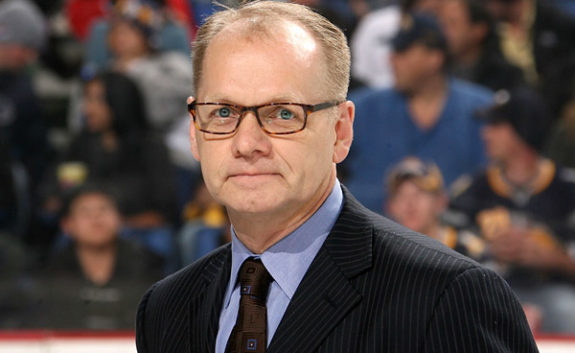
Fast forward over six and a half years later and here we are.
Suffering.
The hockey team we all support has floundered for years at the bottom of the league. Never mind not making the playoffs since the 2011-12 season, the Sabres haven’t gotten a sniff of them. They’ve finished with 89, 82 (pace), 52, 54, 81, 78, 62, and 76 points. The closest they’ve been to a playoff spot was that 2011-12 season where they missed by three points. That seems like a distant memory. Bear in mind this is in a league where over half of the teams qualify for the playoffs each season.
Last season, the Sabres won the heralded November Championship, compiling a 10-game win streak and vaulting them to the top of the standings. We don’t need to discuss how things went after that.
This season, the Sabres are currently four points out of a playoff spot and are on pace to finish the “Golden Season” with 86 points. That would be a solid finish, given the team’s recent history, but it’s ultimately still not where they want to be.
Frustrations Mounting for Sabres and Fans
What makes things particularly frustrating is the way the point totals are reached. After last season’s debacle, the Sabres started this season 8-1-1 and once again sat atop the league’s standings. Since then, they’ve plummeted, going 2-8-2 and entering the toughest part of their season.
Realistically, expectations were fairly low going into this campaign as little had changed from last season’s squad. A handful of new players were added but very few elements of last season’s team were removed. As a result, the team looks very similar. They are currently situated where most would probably have expected them to be.

Frustrations are no doubt mounting. The team took a break from their traditional practice on Wednesday to instead play soccer in the atrium of the arena. Frustrations with the fanbase have been long established.
At times like this, it’s vital that both parties learn where to put their focus. There are basically two things that can be focused on: the results and the process.
Sabres Should Focus on the Process
The results are easy to define: how many wins does the team have? Ultimately, the results are what truly matters. Results win cups.
What the Sabres and their fans should be focusing on is the process. “Process” has a very broad meaning and it’s been going for at least six seasons. It started with moving on from every vestige of the old core lineup. They then needed to give themselves the best opportunity to draft the best players they can. Finally, they need to solidify the new core and find a style of game that becomes a staple of how they play.
The bulk of the heavy lifting has been done. The Sabres have used three general managers to complete it. Their new core consists of Jack Eichel, Sam Reinhart, Jeff Skinner and Rasmus Dahlin. It’s now time to find a way to mesh this new core together with supplementary pieces and find a style of game that can succeed for that core.
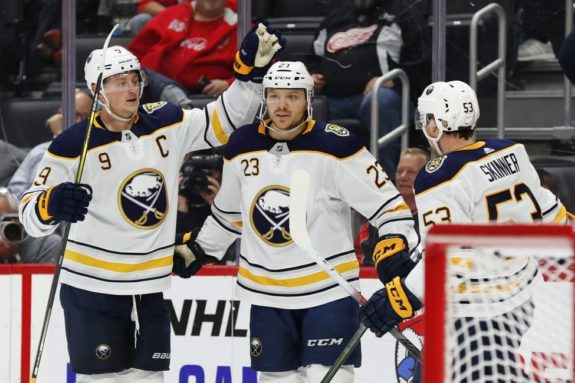
The results are not a healthy way for either the team or the fans to assess the situation. With each loss comes more frustration at how exasperatingly bad they have been at hockey, and the negative results of each season begin to pile on one another. As we said, results are ultimately what’s most important and that’s what makes it so challenging.
When someone decides they want to lose some weight, what is most important? Obviously, it’s the fact that they drop a few pounds. But if that person weighs themselves multiple times each day, what will they find? Normally there will be fluctuations up and down. Seeing effort not rewarded the way they deem it to be can be deflating and can cause some to begin to give up.
What’s most important is for the person to focus on their habits. Look at the small things in their life that they are doing right. If they’re backing down on the things that got them in trouble before and learning new habits that will get them where they want to be, that’s what is most important. Maintaining those habits will ultimately bring them what they want… RESULTS.
For the Sabres, the processes of the past have not brought results. It’s time to develop that identity and start building new habits that will bring them what they want.
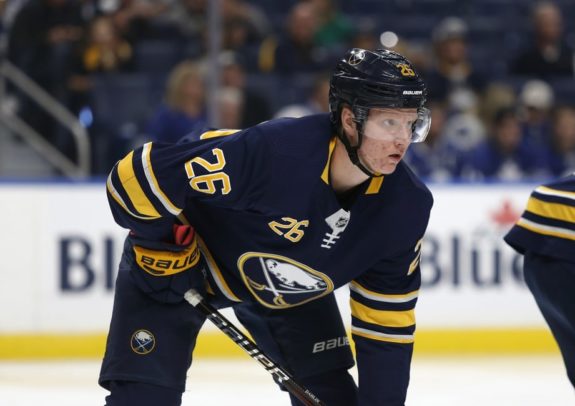
What are the habits of a successful hockey team? Scoring more goals than the opponent. Duh. But how do they score more goals? What is it that they do that is so special and has been so elusive to the Sabres for the better part of a decade?
Causes for Frustration Abundant
The thought for some time was getting pucks toward the net. This certainly doesn’t hurt. But there is more to it than that. What really matters is where these pucks are coming from and under what circumstances. That’s where the expected goals for percentage (xGF%) stat becomes particularly useful. Not only does it look at the quality of chances you create, it also looks at the quality you allow and then shows what percentage of quality chances you control.
Since the Sabres last made the playoffs, here are where Stanley Cup champions have finished in xGF% at five-on-five when adjusted for score effects according to Evolving Hockey; Los Angeles Kings sixth (52.55xGF%), Chicago Blackhawks fourth (54.39xGF%), Kings fourth (55.4xGF%), Blackhawks 18th (50.88xGF%), Pittsburgh Penguins first (55.79xGF%), Penguins fifth (52.78xGF%), Washington Capitals 24th (47.53xGF%) and St Louis Blues fourth (54.04xGF%).

Outside of the Capitals, it’s abundantly clear that being on the positive side of xGF% is crucial to having success. Just last season, the four conference finalists all finished in the top seven in xGF% in the regular season. Care to guess where the Sabres have finished each of these non-playoff seasons? 21st (48.12xGF%), 30th (43.2xGF%), 30th (41.4xGF%), 30th (39.17xGF%), 22nd (47.55xGF%), 26th (47.71xGF%), 31st (45.39xGF%) and 22nd (47.55xGF%). This season, they are currently 27th (47.28xGF%).
Those numbers are pretty incriminating.
They tell the story of a team by times bereft of talent. Even the teams that had the talent still rarely controlled the puck. When they did have a measure of success offensively, they failed miserably in defending their own zone.
These numbers tell a story of suffering.
So where is the leak in the hose? There are teams that perhaps fall short in one aspect but continue to do well in the other. This season, for example, the Colorado Avalanche, Florida Panthers, Philadelphia Flyers, Winnipeg Jets and Blues are all currently in playoff spots although they are in the bottom third of the league in terms of xGF%. Conversely, the Minnesota Wild and Tampa Bay Lightning are both in the top 10 in xGF% but find themselves outside the playoffs currently.
Why have the Sabres scraped the dregs of the NHL for so long? What can we pinpoint as to the reason this team has failed so miserably in results and process?
Laying Blame for Sabres’ Struggles
Some will point to roster construction. This is a fair point. Former general manager Tim Murray apparently cared little about the defence and seemed disinterested in building depth at the American Hockey League level. This left the team extremely thin on the blue line for a number of seasons.
Current general manager Jason Botterill appears to have gone in a different direction. Having now stockpiled 12 capable NHL defencemen, his forward depth has been depleted and the team has been forced to start career AHL defenceman John Gilmour on the wing. The lack of depth has been felt on the scoresheet. Unless you are named Eichel, Skinner or Reinhart you are apparently not permitted to score. We are, in fact, now at four games in a row without a goal from a forward not named Eichel.
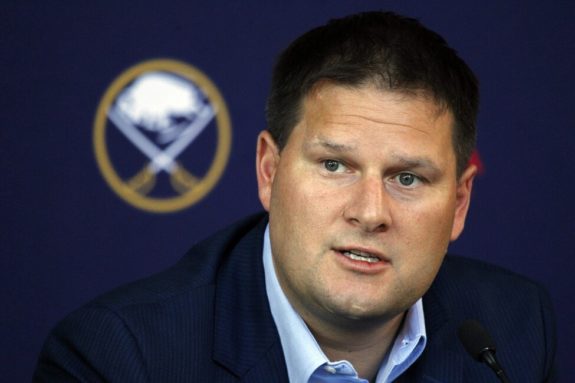
Others point to inept coaching. This too is fair. Ted Nolan was hired for… reasons. Perhaps it was to appease a blue-collar fan base drunk on feelings of nostalgia. Dan Bylsma failed to ever truly connect with his team, and the team failed to connect with him. Phil Housley struggled with managing the game and evening out his offence which led to his departure.
Ralph Krueger has only been behind the bench for 22 games. The big picture points to a team headed in the same direction as previous iterations based on results. Let’s instead examine the process using Natural Stat Trick.
Reasons for Hope Under Krueger
Two seasons ago, under Housley, the Sabres completed 30 of their 82 games over 50xGF%. That means that just 36.6 percent of their games finished with them controlling the greater share of scoring opportunities. Last season, 32 of 82 games met that mark, good for an increase to 39 percent.
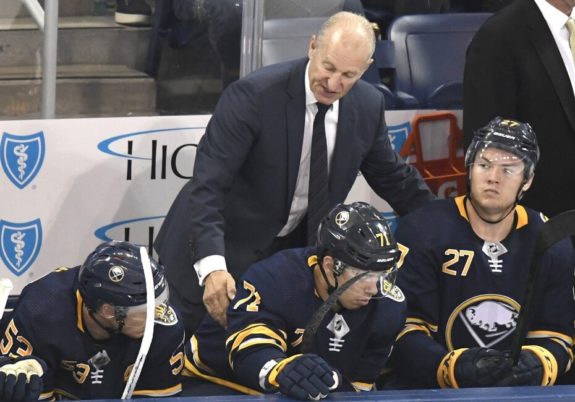
This season, they have currently compiled eight of 22 games above 50xGF%, on pace for 36.3 percent of their games finishing positively by this metric. This is no doubt concerning. However, four of those eight positive games have occurred over the last five games. Their record over that time? They collected just three of 10 possible points.
This can still be taken as good news. This last stretch of games has seen the Sabres exercising and eating right, as it were, while not necessarily losing the weight they are trying to lose. The fact is, though, that winning the expected goals battle night in and night out is the recipe to having a winning team. It certainly seems reasonable that it would take some time for the team to truly adopt the new system and extinguish their old habits. Might Krueger be gaining some traction in his bid to build new habits in his squad?
The last game against the Boston Bruins was quite possibly the best game the Sabres have played in weeks. They owned the Bruins early on and had a lead. Ever confident in themselves, the Bruins stayed the course, played their game and rode a ridiculous save from Tuukka Rask to a 3-2 win.
Not seeing the results right now is frustrating. Seeing the process start to turn around gives a reason for hope. Hope that perhaps with a few more pieces up front this team could ice a more balanced attack. Hope that Krueger can find a way to reach this team and turn the rudder to calmer seas. Hope that soon the results will come and we won’t have to worry about the process.
In the meantime, it’s imperative for both the team and fanbase to just trust the process as long as it’s working. It’s the healthy thing to do.